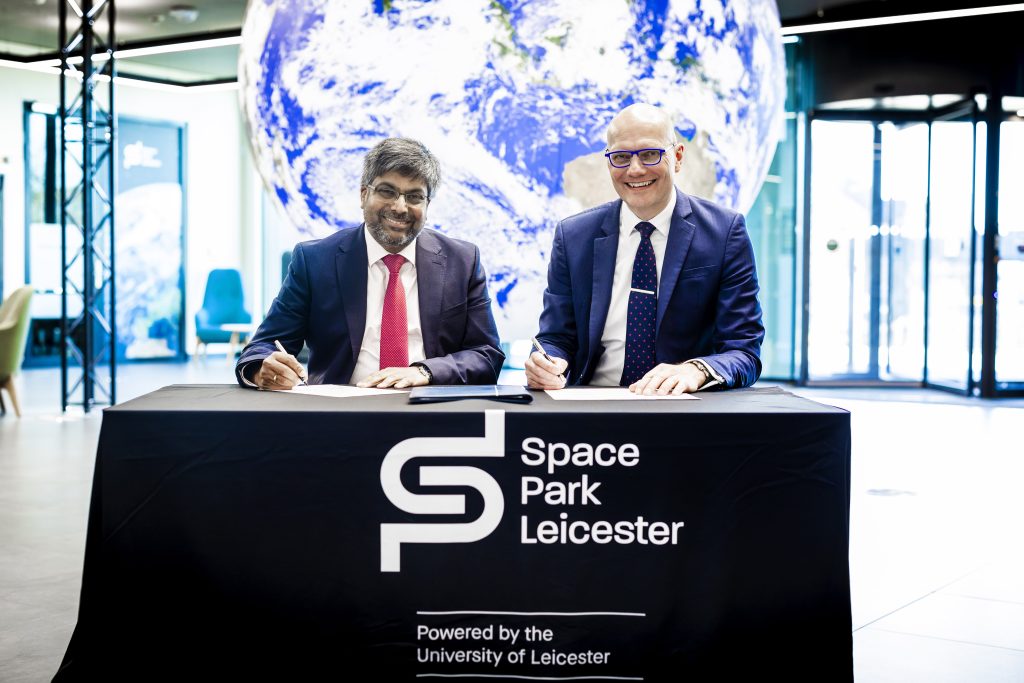New Strategic Collaboration between University of Leicester and National Nuclear Laboratory links academia and industry

Senior leaders at the University of Leicester and the National Nuclear Laboratory (NNL) have established a strategic collaboration between their two organisations, bringing pioneering work in nuclear power to the University’s education and research mission.
They met at Space Park Leicester, the University’s space campus, on 2 February 2024 to sign an agreement to continue to collaborate on areas of mutual interest, including cutting-edge nuclear power systems for the space industry.
NNL is the UK’s national laboratory for nuclear fission and is working with academics and industry partners to develop spacecraft systems for the European Space Agency that provide reliable, long-lived power for harsh environments.
It has created a process to extract Americium-241 from stored nuclear material and repurpose it as fuel for systems developed by the University of Leicester, with support from the European Space Agency and the UK Space Agency, for use in future space missions.
The new Letter of Intent between the two organisations will also see them explore opportunities to support student education and career paths around the nuclear and nuclear space industry, joint research activity and establishing an international profile for nuclear research and expertise.
In 2022, NNL opened a new presence at Space Park Leicester, building on 10 years of successful joint projects in the development of space nuclear power systems.
Professor Paul Howarth, Chief Executive Officer of National Nuclear Laboratory, said:
“I am delighted to celebrate and formalise the National Nuclear Laboratory’s strategic collaboration with the University of Leicester that commenced over ten years ago. The development of our existing relationship with the University demonstrates our commitment to driving nuclear-relevant research, skills, and capabilities in the Midlands and across the UK.
“This strategic collaboration will enable us to strengthen our joint capability in the nuclear fuel cycle and its application to space exploration and health and nuclear medicine, whilst providing a firm basis for investigating other joint research topics.
“The collaboration will play a vital role in the UK’s ability to deliver on the next wave of space-related nuclear power technologies, as well as supporting advances in transformative health and nuclear-related medicine. By harnessing both NNL’s and the University of Leicester’s world-leading facilities and capabilities, we will develop, strengthen, and maintain existing expertise in the nuclear sector but also ensure we have the people and skills for the UK’s new clear future.”
Professor Nishan Canagarajah, President and Vice-Chancellor at the University of Leicester, said: “Exploring the new frontiers of our universe requires innovative thinking, diverse expertise and collaboration across industry and academia. Space Park Leicester was established to foster such collaborations and I am delighted to see that in action through our partnership with the National Nuclear Laboratory, which not only cements Leicester’s place in the space economy as Britain’s Space City but also prepares our students for the space careers of the future.”

Professor Richard Ambrosi, Space Park Leicester Executive Director, said: “This is a significant moment in the long collaboration between the University of Leicester and NNL spanning more than a decade. Together we are addressing some of the most challenging space science and exploration requirements in the Solar System. Enabled by radioisotope and nuclear power technologies, the UK and Europe is transforming power generation in space.”
Professor Tim Tinsley, Account Director of National Nuclear Laboratory said:
“I’ve been working with the excellent team at the University of Leicester for over a decade. This agreement enables us to move the relationship further into a collaborative position and jointly deliver the cutting-edge nuclear power systems we have been developing for the space industry.”
- Find out more about the University of Leicester
- Find out more about National Nuclear Laboratory


